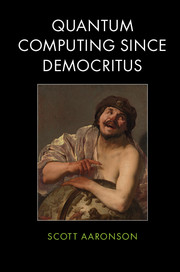Book contents
- Frontmatter
- Dedication
- Contents
- Preface
- Acknowledgments
- 1 Atoms and the void
- 2 Sets
- 3 Gödel, Turing, and friends
- 4 Minds and machines
- 5 Paleocomplexity
- 6 P, NP, and friends
- 7 Randomness
- 8 Crypto
- 9 Quantum
- 10 Quantum computing
- 11 Penrose
- 12 Decoherence and hidden variables
- 13 Proofs
- 14 How big are quantum states?
- 15 Skepticism of quantum computing
- 16 Learning
- 17 Interactive proofs, circuit lower bounds, and more
- 18 Fun with the Anthropic Principle1
- 19 Free will
- 20 Time travel
- 21 Cosmology and complexity
- 22 Ask me anything
- Index
3 - Gödel, Turing, and friends
Published online by Cambridge University Press: 05 April 2013
- Frontmatter
- Dedication
- Contents
- Preface
- Acknowledgments
- 1 Atoms and the void
- 2 Sets
- 3 Gödel, Turing, and friends
- 4 Minds and machines
- 5 Paleocomplexity
- 6 P, NP, and friends
- 7 Randomness
- 8 Crypto
- 9 Quantum
- 10 Quantum computing
- 11 Penrose
- 12 Decoherence and hidden variables
- 13 Proofs
- 14 How big are quantum states?
- 15 Skepticism of quantum computing
- 16 Learning
- 17 Interactive proofs, circuit lower bounds, and more
- 18 Fun with the Anthropic Principle1
- 19 Free will
- 20 Time travel
- 21 Cosmology and complexity
- 22 Ask me anything
- Index
Summary
In the last chapter, we talked about the rules for first-order logic. There's an amazing result called Gödel's Completeness Theorem that says that these rules are all you ever need. In other words: if, starting from some set of axioms, you can't derive a contradiction using these rules, then the axioms must have a model (i.e., they must be consistent). Conversely, if the axioms are inconsistent, then the inconsistency can be proved using these rules alone.
Think about what that means. It means that Fermat's Last Theorem, the Poincaré Conjecture, or any other mathematical achievement you care to name can be proved by starting from the axioms for set theory, and then applying these piddling little rules over and over again. Probably 300 million times, but still...
How does Gödel prove the Completeness Theorem? The proof has been described as “extracting semantics from syntax.” We simply cook up objects to order as the axioms request them! And if we ever run into an inconsistency, that can only be because there was an inconsistency in the original axioms.
One immediate consequence of the Completeness Theorem is the Löwenheim–Skolem Theorem: every consistent set of axioms has a model of at most countable cardinality. (Note: One of the best predictors of success in mathematical logic is having an umlaut in your name.) Why? Because the process of cooking up objects to order as the axioms request them can only go on for a countably infinite number of steps!
- Type
- Chapter
- Information
- Quantum Computing since Democritus , pp. 18 - 28Publisher: Cambridge University PressPrint publication year: 2013



